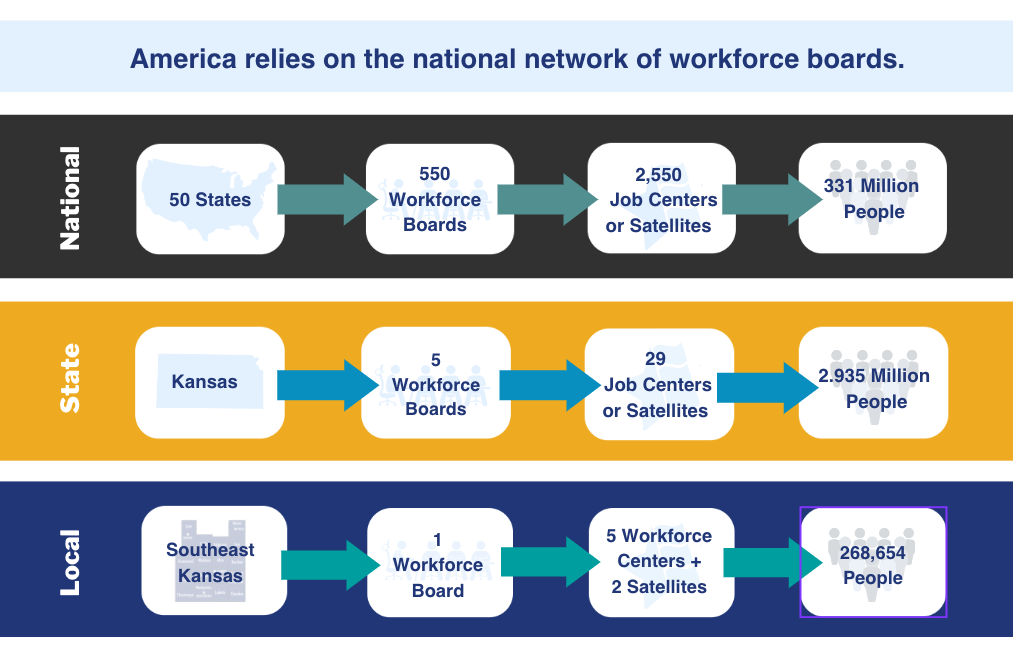Upcoming Meetings:
Meeting Minutes
PY 2021 | |
August 19, 2021 | |
November 18, 2021 | |
February 17, 2022 | |
May 12, 2022 | |
PY 2022 | |
August 18, 2022 | |
November 10, 2022 | |
February 16, 2023 | |
May 2023 | Cancelled due to lack of quorum. |
PY 2023 | |
August 17, 2023 | |
November 16, 2023 | |
February 15, 2024 | |
May 16, 2024 | |
Guidance
Partner
Driven
Market
Responsive
Results
Oriented
Chief Elected Officials Board
Terry Weidert Labette County Commissioner Region II | Robert Bever Montgomery County Commissioner Region II | Bonnie (Rob) Robberts Miami County Commissioner Region III CEOB Chair – Executive Team | Les McGhee Anderson County Commissioner Region IV | Wayde Thomsen Coffey County Commissioner Region V |
Responsibilities of the CEOs under WIOA include, but are not limited to, the following:
- Determine the size and membership of the LWDB, based upon the criteria established by WIOA, and appoint members to the local board.
- Serve as grant recipient and assume fiscal liability for grant funds for WIOA Title I adult, dislocated worker and youth activities; as well as other such federal or state workforce funds as may be awarded.
- Approve budgets for carrying out the responsibilities of the Local Board.
- Provide comprehensive oversight of the activities of the Local Board.
- Ensure that local area partnerships are functioning effectively.
In partnership with the Local Board:
- Participate in the development of the Local Area Plan.
- Conduct oversight of the One-Stop delivery system, youth activities, and employment and training activities.
- Select One-Stop operators and eligible service providers and oversee compliance and continuance improvement (may subsequently terminate these for cause).
- Agree on Memorandums of Understanding between the Local Board and the One-Stop operator(s).
- Negotiate and reach agreement on performance standards and any additional local performance measures.
In partnership with the Governor:
- Agree on whether the Local Board may provide core services, intensive service, or both.
- Agree on whether the Local Board may serve as a One-Stop operator.
- Negotiate waiver requests as needed.
Local Workforce Development Board
Jennifer Augustine VR Regional Manager DCF – Vocational Rehabilitation | Lacie Bohr Regional Operations Manager Department of Commerce | Lisa Brumbaugh Director ESU Small Business Development Center | Sam Budreau HR Director Monarch Cement Company |
Mark Doebele Asst. General Manager 4 Rivers Electric Co-op | Brenda Krumm Dean of Outreach & Workforce Development Neosho County Community College | Tim Carty Founder & Lead Engineer Emp Shield | Executive Team – Chair Ron Marrone Vice-President Marrone’s, Inc. |
Darin Mason Training Director Topeka JATC | Executive Team – Vice-Chair Gary Mattson HR Director Kansas Crossing Casino | Colleen Fagan HR Manager Russell Stover | Connor Phillips Director of Programming Jobs for America’s Graduates – Kansas |
Bill Ritter Assistant Business Manager IBEW | Leo Sievert HR Director Sanderson Pipe | Sharla Hopper Administrator Elmhaven | Karen Ulanski Director of Adult Education Paola Adult Education Center |
(Robert) Nic Thomas Labor Representative Plumbers and Pipeline Local 441 | Kenny Finley CEO SawHaul |
The purpose of the Local Workforce Development Board (LWDB) is to:
- Provide strategic and operational oversight in collaboration with the required and additional partners and stakeholders to help develop and comprehensive and high-quality workforce development system in the local area and larger planning region.
- Assist in the achievement of the State’s strategic and operational vision and goals as outlined in the Unified State Plan or Combined State Plan.
- Maximize and continue to improve the quality of services, customer satisfaction, and effectiveness of the services provided.
The Workforce Innovation and Opportunity Acts vision for the Local WDB is to serve as a strategic leader and convener of local workforce development system stakeholders. The Local WDB partners with employers and the workforce development system to develop policies and investments that support public workforce system strategies that support regional economies, the development of effective approaches including local and regional sector partnerships and career pathways, and high quality, customer centered service delivery and service delivery approaches.


